
The Watergate scandal was a significant political controversy in the United States during the presidency of Richard Nixon from 1972 to 1974, ultimately resulting in Nixon's resignation. It originated from attempts by the Nixon administration to conceal its involvement in the June 17, 1972, break-in at the Democratic National Committee headquarters located in the Watergate Office Building in Washington, D.C.

Daniel Ellsberg was an American political activist, economist, and United States military analyst. While employed by the RAND Corporation, he precipitated a national political controversy in 1971 when he released the Pentagon Papers, a top-secret Pentagon study of U.S. government decision-making in relation to the Vietnam War, to The New York Times, The Washington Post, and other newspapers.

All the President's Men is a 1974 non-fiction book by Carl Bernstein and Bob Woodward, two of the journalists who investigated the June 1972 break-in at the Watergate Office Building and the resultant political scandal for The Washington Post. The book chronicles the investigative reporting of Woodward and Bernstein from Woodward's initial report on the Watergate break-in through the resignations of Nixon Administration officials H. R. Haldeman and John Ehrlichman in April 1973, and the revelation of the Oval Office Watergate tapes by Alexander Butterfield three months later. It relates the events behind the major stories the duo wrote for the Post, naming some sources who had previously refused to be identified for their initial articles, notably Hugh Sloan. It also gives detailed accounts of Woodward's secret meetings with his source Deep Throat, whose identity was kept hidden for over 30 years. Gene Roberts, the former executive editor of The Philadelphia Inquirer and former managing editor of The New York Times, has called the work of Woodward and Bernstein "maybe the single greatest reporting effort of all time."
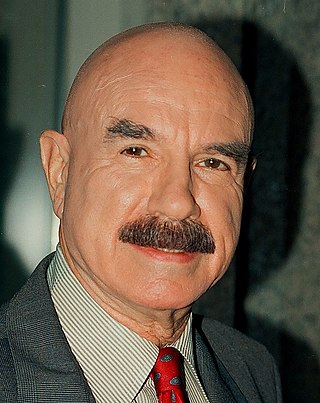
George Gordon Battle Liddy was an American lawyer, FBI agent, and a criminal who was convicted of conspiracy, burglary, and illegal wiretapping for his role in the Watergate scandal during the Nixon administration.

The Committee for the Re-election of the President was, officially, a fundraising organization of United States President Richard Nixon's 1972 re-election campaign during the Watergate scandal. In addition to fundraising, the organization also engaged in political sabotage against Nixon's opponents, the various Democratic politicians running in the election.

John Daniel Ehrlichman was an American political aide who served as White House Counsel and Assistant to the President for Domestic Affairs under President Richard Nixon. Ehrlichman was an important influence on Nixon's domestic policy, coaching him on issues and enlisting his support for environmental initiatives.

Charles Wendell Colson, generally referred to as Chuck Colson, was an American attorney and political advisor who served as Special Counsel to President Richard Nixon from 1969 to 1970. Once known as President Nixon's "hatchet man", Colson gained notoriety at the height of the Watergate scandal, for being named as one of the Watergate Seven and also for pleading guilty to obstruction of justice for attempting to defame Pentagon Papers defendant Daniel Ellsberg. In 1974, Colson served seven months in the federal Maxwell Prison in Alabama, as the first member of the Nixon administration to be incarcerated for Watergate-related charges.

Deep Throat is the pseudonym given to the secret informant who provided information in 1972 to Bob Woodward, who shared it with Carl Bernstein. Woodward and Bernstein were reporters for The Washington Post, and Deep Throat provided key details about the involvement of U.S. president Richard Nixon's administration in what came to be known as the Watergate scandal. In 2005, 31 years after Nixon's resignation and 11 years after Nixon's death, a family attorney stated that former Federal Bureau of Investigation (FBI) Associate Director Mark Felt was Deep Throat. By then, Felt was suffering from dementia and had previously denied being Deep Throat, but Woodward and Bernstein then confirmed the attorney's claim.

The White House Plumbers, sometimes simply called the Plumbers, the Room 16 Project, or more officially, the White House Special Investigations Unit, was a covert White House Special Investigations Unit, established within a week of the publication of the Pentagon Papers in June 1971, during the presidency of Richard Nixon. Its task was to stop and/or respond to the leaking of classified information, such as the Pentagon Papers, to the news media. The work of the unit "tapered off" after the bungled "Ellsberg break-in" but some of its former operatives branched into illegal activities while still employed at the White House together with managers of the Committee to Re-elect the President, including the Watergate break-in and the ensuing Watergate scandal. The group has been described as Nixon's "fixers".

Bernard Leon Barker was a Watergate burglar and undercover operative in CIA-directed plots to overthrow Cuban leader Fidel Castro.

The Senate Watergate Committee, known officially as the Select Committee on Presidential Campaign Activities, was a special committee established by the United States Senate, S.Res. 60, in 1973, to investigate the Watergate scandal, with the power to investigate the break-in at the Democratic National Committee (DNC) headquarters at the Watergate office complex in Washington, D.C., and any subsequent cover-up of criminal activity, as well as "all other illegal, improper, or unethical conduct occurring during the controversial 1972 presidential election, including political espionage and campaign finance practices".
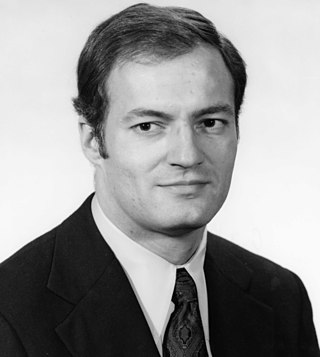
Egil "Bud" Krogh Jr. was an American lawyer who became infamous as an official of the Nixon administration and who was imprisoned for his part in the Watergate scandal. He was a Senior Fellow on Ethics and Leadership at the Center for the Study of the Presidency and Congress and Counselor to the Director at the School for Ethics and Global Leadership.

The Watergate scandal refers to the burglary and illegal wiretapping of the headquarters of the Democratic National Committee, in the Watergate complex by members of President Richard Nixon's re-election campaign, and the subsequent cover-up of the break-in resulting in Nixon's resignation on August 9, 1974, as well as other abuses of power by the Nixon White House that were discovered during the course of the scandal.
The Huston Plan was a 43-page report and outline of proposed security operations put together by White House aide Tom Charles Huston in 1970. It came to light during the 1973 Watergate hearings headed by Senator Sam Ervin. According to U.S. Senator Charles Mathias, U.S. President Richard Nixon rescinded the plan on July 28, 1970, after approving it on July 23. Mathias commented that "Many constitutional lawyers believe that for five days in 1970 the fundamental guarantees of the Bill of Rights were suspended by the mandate given the secret 'Huston plan'," and that during the five days the plan was approved, "authoritarian rule had superseded the constitution." Specifically, the authorization was to suspend the protections from the Fourth Amendment to the U.S. Constitution against unreasonable searches and seizures.
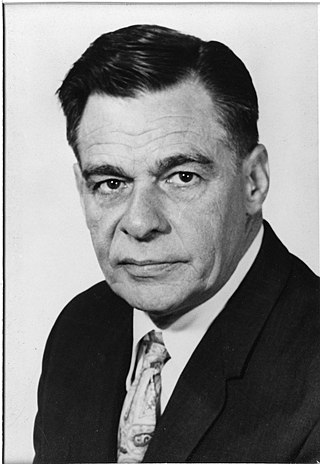
Henry E. Petersen was an attorney and United States federal government official. He served as Assistant U.S. Attorney General during the Richard Nixon and Gerald Ford administrations. He also engaged in ethically questionable communications with Nixon and his staff, providing inside information about the Watergate investigation prior to the appointment of the Special Prosecutor.
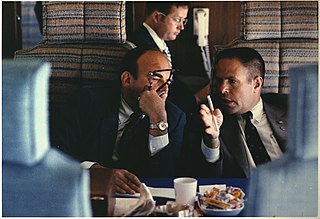
Operation Sandwedge was a proposed clandestine intelligence-gathering operation against the political enemies of U.S. President Richard Nixon's administration. The proposals were put together by Nixon's Chief of Staff H. R. Haldeman, domestic affairs assistant John Ehrlichman and staffer Jack Caulfield in 1971. Caulfield, a former police officer, created a plan to target the Democratic Party and the anti-Vietnam War movement, inspired by what he believed to be the Democratic Party's employment of a private investigation firm.
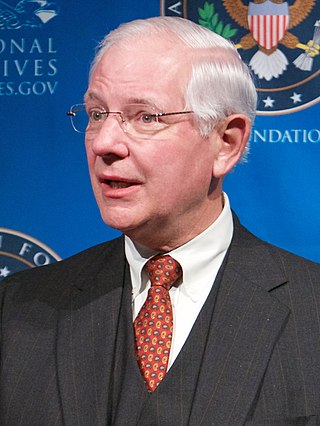
Geoffrey Carroll Shepard is an American lawyer, author and lecturer.
Blind Ambition is a four-part American miniseries that aired on CBS from May 20, 1979 to May 23, 1979 focusing on the 1972–74 Watergate scandal and based on the memoirs of former White House counsel John Dean and his wife Maureen.
The following is a timeline of the presidency of Richard Nixon from January 1, 1974, to August 9, 1974, when, in the face of almost certain impeachment and removal from office, he resigned the presidency.
White House Plumbers is an American satirical political drama television miniseries created and written by Alex Gregory and Peter Huyck and directed by David Mandel, based on the 2007 book Integrity by Egil Krogh and Matthew Krogh. The series stars Woody Harrelson, Justin Theroux, Domhnall Gleeson, Kiernan Shipka, and Lena Headey and it premiered on HBO on May 1, 2023.













